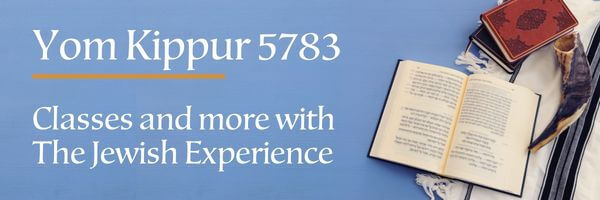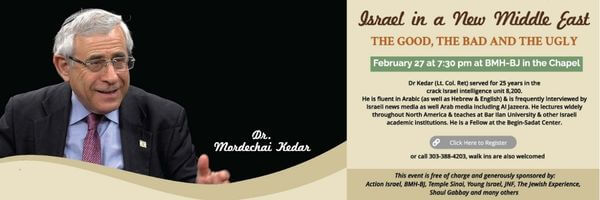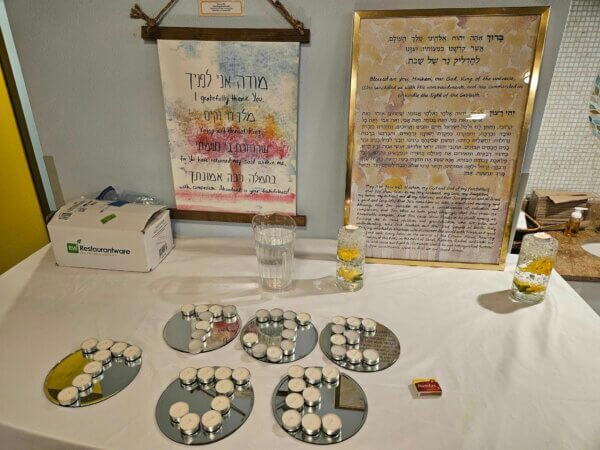SPARKS OF TORAH
VOLUME 64 NUMBER 3
January 18, 2013
7 Shevat, 5773
Parshas Bo
Candle-lighting Time: 4:45 PM
This edition of Sparks of Torah is dedicated in honor of the Dessert Team Captains, for all your hard work preparing your amazing desserts. May the tastiest dessert win!
FYI
- Register now for Wine, Cheese & Chocolate 2013, Saturday night, Feb. 2nd. Toast Rabbi Leban, vote for your favorite dessert, and show your support for TJE. (303) 316-6412
- Oneg Shabbos, Friday night, January 25th at the home of Rabbi Gadi and Eve Levy. RSVP (303) 316-6412
- Having a baby? Mazel Tov! Join Eve Levy for a new class on Jewish birth and beyond.
- Looking for a Sunday school your kids will actually look forward to? Try the Sunday Experience. More information at www.theje.com.
Know Before You Go
by Rabbi Raphael Leban
Many years ago, when I was in Jerusalem, a teacher of mine, Rabbi Moshe Lazerus, told the following story. It’s a simple story, but the point he made with it is so powerful, I’ve never forgotten it.
One Friday morning he was spending some ‘quality’ time with one of his children. Rabbi Lazerus would regularly take his children one at a time on special trips. This particular morning they had gone to a modern art gallery.
As they were strolling through the paintings, he found himself thinking, “What’s so great about these paintings? I think the drawings my kids put on our fridge are better!”
In front of one of the pieces was a man. He was standing and staring at a painting for a long time. Rabbi Lazerus wondered what he could possibly see in it.
After a while, they passed by the painting a second time, and the same man was still standing and gazing, clearly transfixed by what he saw. “What a dope,” thought the Rabbi, “How could he enjoy that stuff so much?”
He and his son finished their short tour of the gallery and left.
Afterwards, Rabbi Lazerus had quite a different thought. While reflecting on the guy staring at the painting that he himself had found totally uninteresting, it hit him. That guy wasn’t a dope. The reason he could enjoy such a painting was because he knew something about modern art. The more you know about something, the more enjoyable it is for you. “I’m the dope!” the Rabbi thought. “I don’t know anything about modern art, and so I had no pleasure whatsoever in looking at it.”
The same painting was simultaneously a tremendous source of pleasure for one person, and a source of discomfort to another.
In this week’s parsha, Egypt is struck by the Plague of Darkness. Moshe is told to “stretch out [his] hand upon the Heavens.” The Slonomer Rebbe asked, why didn’t G-d say “lift up your hand to the Heavens”? Is the darkness somehow resting upon the Heavens that Moshe can bring it from there?
If you stare at a very powerful light, like the sun, it blinds you. Unless your eyes are prepared for it, you can’t handle it.
Moshe drew forth a heavenly light, whose place was upon the Heavens. For the Egyptians, such a bright spiritual light was a blinding darkness. “…and for all the Children of Israel, there was light in their dwellings.” Our ancestors could see. For them light was just that—light.
In a medrish that describes the World to Come, it says that G-d will bring out a burning sun from His pouch. The wicked will be judged by it, and the righteous will be healed by it. The World to Come is a profound and powerful spiritual experience. For those who are prepared and knowledgeable, it will be an unbelievable pleasure. For those who know nothing about it, the experience could even be painful.
Life is a precious opportunity to learn about closeness with G-d. Failing to do so is like planning a trip to the eternal gallery of disappointment and boredom. Taking advantage of the opportunity will turn you into an aficionado of ultimate joy.
What Really Matters
by Rabbi Dovid Nussbaum
It seemed as though Pharaoh’s resolve to retain his hold on the Jewish people was weakening. Although the Egyptian empire had survived seven devastating attacks, apparently it was enough and they were not prepared to suffer another assault upon their already destabilized kingdom. Therefore, when Moshe warned them about the imminent plague of locust, Pharaoh’s advisers warned him that the empire was about to be destroyed and they capitulated.
However, as the Bnei Yisroel were about to leave, Pharaoh called them back. He agreed that they could go to the desert and enjoy a holiday outing with Hashem. However, in an apparent reversal he then questioned Moshe as to who would be joining this party. Moshe answered that everyone was going, the elders, the young people, the women, the entire nation. Pharaoh refused to comply and would only allow the men to go. Why did he care who went if he had already granted them permission to go?
Malbim points out that those who served idols in those days believed that there were two different powers in the universe. The power of the forces that represent good and the power of the forces that represent evil, and the two do not merge in the middle. When they would approach the powers of good to ask for blessing, they would take their families with them. After all, that was the point of going to those powers, i.e. so that they would receive their blessings. However, when they went to the powers of evil, they took sacrifices to give the blood, fat and limbs of the various sacrifices. They felt that the blood from these offerings would appease the powers and they would not bother them.
When Moshe demanded that Pharaoh release the entire nation and allow them to brings sacrifices together, this approach was unfamiliar to Pharaoh and therefore he wouldn’t allow the entire assemblage to vacate Egypt because he assumed that this was a scheme which was a prelude to a mass escape, which indeed it was. However, his assumption was predicated upon his perspective of how one serves idols, which, of course, was diametrically opposed to our concept of serving Hashem which includes everyone, at every level, and every angle.
This lack of focus which defined Pharaoh’s comprehension of ‘religion’ perhaps requires some introspection and perhaps even some soul searching. What is our attitude when it comes to including our entire family in serving Hashem? Do we feel that what we are involved in should be the focus of our family or do we view our involvement as an external appendage that does not really attach itself to the main body of our life and soul? If our reaction is the latter, then that might sum up why others in our respective families are not focused the way they should be. After all, the focus of what we consider significant for ourselves is not inclusive of the entire ‘assemblage’ of our mini-nation that populates our homes and communities.
One of the main functions of the Yom Tov of Pesach, which is not that far away, is to promote the family unit and its importance in promulgating our future generations. Pharaoh, at some level, appreciated that significance and desired to eliminate that opportunity from Moshe. However, Moshe very astutely pointed out that the wives, the children and the extended family are really and truly what it’s all about. We represent inclusion not exclusion and the sooner we begin to operate at that level, the healthier we will be.
Question for the Rabbis
By Rabbi Mordechai Becher, reprinted with permission from www.partersintorah.org.
“This month shall be for you the first of months…” (Exodus 12:2). Rashi explains that according to the straightforward reading of the text, there is an obligation, a mitzvah, to count Nisan as the first month. Nachmanides also maintains that there is a mitzvah to count the months from Nisan as a reminder of the Exodus. Based on these comments, Rabbi Moshe Sofer (Torat Moshe on Bo) rules that one should not use the numbers of the months of the secular calendar, since by counting them one is annulling the mitzvah of counting from Nisan. Some authorities permit this and maintain that the mitzvah of counting the months is a mitzvah for the Jewish court and does not obligate each individual (Responsa Binyan Shlomo 22). Others defend the common practice to use the numbers of the secular months and maintain that if it is for purely pragmatic purposes and without intention to detract from the importance of the Jewish calendar and the primacy of Nisan, then it is permitted (Minchat Asher, Exodus 14:2).
Joke of the Week
Protect your bagels, put lox on them.
BYTE FOR SHABBOS
When we left Egypt it was both a physical and spiritual redemption. Thus we have four parts in our tefillin. Two refer to the Exodus from Egypt and the other two allude to our receiving the
S’FAS EMES
GOOD SHABBOS!



